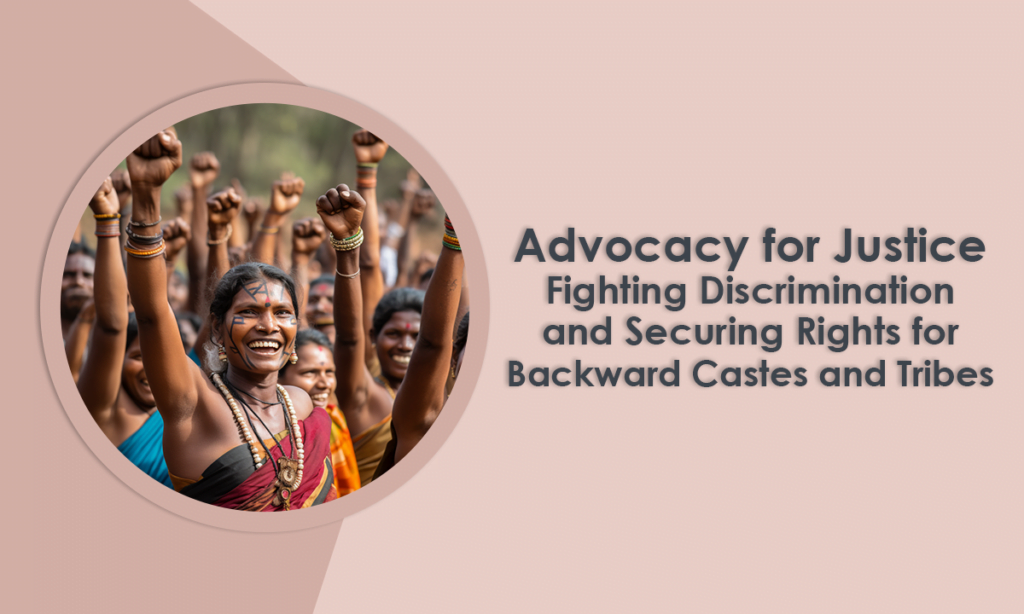Introduction
India, with its rich cultural diversity, is home to various social groups that have historically faced discrimination and marginalization. Among these are the Backward Castes and Tribes, often referred to as Scheduled Castes (SC), Scheduled Tribes (ST), and Other Backward Classes (OBC). Despite constitutional provisions and affirmative action policies, these communities continue to experience social and economic disparities.
This blog post explores the importance of advocacy for justice, shedding light on the challenges faced by these communities and the ongoing efforts to secure their rights in the Indian context.
Historical Background
India’s caste-based society dates back thousands of years, perpetuating a hierarchical social structure that often relegated certain groups to the margins. The Scheduled Castes and Scheduled Tribes have been historically subjected to various forms of discrimination, including social exclusion, denial of basic human rights, and limited access to education and economic opportunities. To address these injustices, the Indian Constitution enshrined specific safeguards and affirmative action provisions to uplift these marginalized communities.
Challenges Faced by Backward Castes and Tribes
Despite constitutional safeguards, the Backward Castes and Tribes still confront significant challenges:
Social Discrimination: Prejudice and discrimination against these communities persist, leading to social segregation and stigmatization.
Educational Barriers: Many members of these communities lack access to quality education due to poverty, lack of infrastructure, and discrimination within educational institutions.
Economic Disparities: Economic inequality is a major concern, with limited access to resources, employment opportunities, and adequate living conditions.
Land Rights: Tribal communities, in particular, face challenges related to land rights and displacement due to development projects.
Political Underrepresentation: Inadequate political representation hampers the ability of these communities to influence policy decisions that directly impact their well-being.
Advocacy for Justice: Initiatives and Progress
Legal and Policy Framework: The Indian Constitution, through Articles 15, 16, 46, and 244, provides a legal foundation for affirmative action policies to uplift marginalized communities. Additionally, laws such as the Scheduled Castes and Scheduled Tribes (Prevention of Atrocities) Act aim to protect these communities from discrimination and violence.
Reservation Policies: The government has implemented reservation policies in educational institutions and public employment to provide equitable opportunities for Backward Castes and Tribes.
Social Initiatives: Non-governmental organizations (NGOs) and civil society groups actively advocate for the rights of these communities by providing support, education, and empowerment programs.
Land and Forest Rights: Efforts are being made to recognize and protect the land and forest rights of tribal communities, ensuring their livelihoods and preserving their cultural heritage.
Awareness and Sensitization: Awareness campaigns and social initiatives are helping combat stereotypes and prejudices against these communities, fostering a more inclusive society.
The Way Forward
While progress has been made, much remains to be done to secure justice and equal rights for Backward Castes and Tribes in India:
Strengthening Implementation: Existing policies and laws need robust implementation, ensuring that the benefits of affirmative action reach those who need them the most.
Empowerment through Education: Increasing access to quality education and skill development will uplift these communities, enabling them to break the cycle of poverty and discrimination.
Economic Empowerment: Creating sustainable livelihood opportunities will help bridge economic disparities and uplift the socio-economic conditions of these communities.
Combating Discrimination: Concerted efforts to promote social integration, dispel stereotypes, and promote empathy are crucial in combating discrimination.
Inclusive Governance: Enhancing political representation and empowering these communities to participate in decision-making processes will strengthen their voices and influence policies that directly affect them.
Conclusion
Advocacy for justice and equal rights for Backward Castes and Tribes is a fundamental step towards building an inclusive and equitable society in India. Through continued efforts in implementing affirmative action policies, increasing educational opportunities, and combatting discrimination, we can create a nation where every citizen, regardless of their social background, has the opportunity to lead a dignified and fulfilling life. It is incumbent upon all stakeholders, including the government, civil society, and individuals, to unite in the pursuit of a more just and compassionate society for all.
